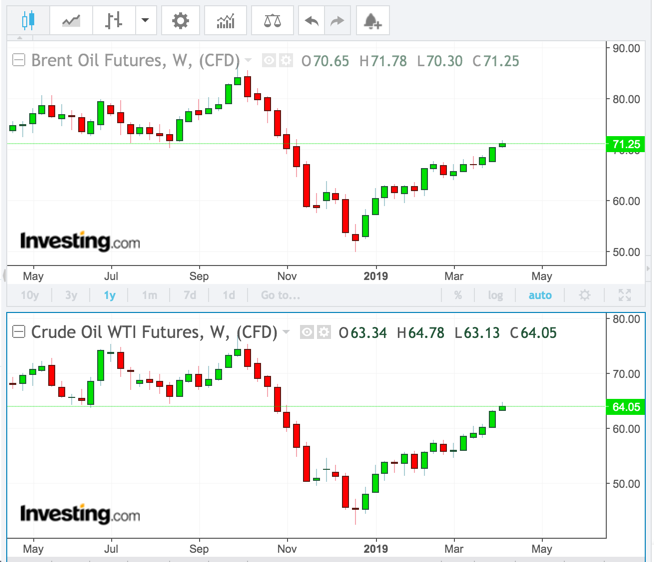Oil prices are rising, with WTI now safely above $60 per barrel and Brent surpassing $70 per barrel. President Donald Trump has already made his dislike of higher oil prices clear, but his policies are a significant contributor to the rise in prices: oil sanctions imposed by the U.S. on Iran and Venezuela have significantly curtailed the amount of oil these countries exported in February and March.
Voluntary production cuts from Saudi Arabia and involuntary cuts from Kazakhstan also took a significant amount of oil off the market in March and will continue to do so in April. Fighting in Libya has also helped push prices higher this week, although the violence has yet to impact oil shipments.

Where are oil prices heading in the second half of 2019? The answer to that lies mostly with OPEC and the Trump administration.
The Trump administration has yet to issue extensions of its waivers to certain countries. These waivers permit these countries to import some Iranian oil without violating the U.S. secondary sanctions. If all the exemptions are extended for an additional 6 months, at least 1.5 million barrels per day (but as much as 1.8 million barrels per day) of Iranian oil could remain on the market in compliance with the sanctions.
The Trump administration is also pushing India to stop importing Venezuelan oil, but how much oil Venezuela brings to the market also depends on the conditions of the country’s oil facilities and electricity supplies.
OPEC and its non-OPEC allies have decided to wait to see what the Trump administration decides to do about the Iranian oil sanctions before considering oil policy for the second half of the year. OPEC, the Saudi-led group of 14 oil producing countries, has cancelled a planned April meeting, preferring to wait until the end of June for its regular meeting, which will allow it to react to Trump’s actions.
OPEC seems to be rethinking its commitment to production cuts, likely in reaction to Trump’s policies. In March, Saudi oil minister Khalid al Falih and others expressed interest in continuing with the production cut agreement for the rest of 2019. He said he did not see any reason to end the agreement, and that he foresees that OPEC, “will just be kicking the can forward” with regards to production.
Now that Brent has surpassed $70 and the Trump administration has still not indicated whether or not it will extend the sanctions exemptions beyond May 4, OPEC and Russia are sending a different message. On April 8, al-Falih said that it is too soon to know whether or not the production cut agreement should be extended. “I think May is going to be key,” he said, indicating that Trump’s decision on the Iran sanctions will be important in OPEC’s production rate considerations.
Russia is clearly not interested in curtailing production any more, particularly if other factors keep Brent oil prices at or near $70 per barrel. Kirill Dmitriev, the head of Russia’s direct investment fund and a supporter of the OPEC—Non-OPEC production cut agreement, recently said that conditions might not warrant a continuation of the production cuts. Vladimir Putin said that he does not want to see oil prices rise too high because it would harm Russian industrial development. Putin said that he is comfortable with prices at the current level.
Keep in mind, however, that Russia has hardly cut production at all in 2019. It did not meet its production cut goals in February or March. The biggest oil producer in the world, Russia could very well support a continuation of the production cuts but simply fail to meet its own quotas, thus capitalizing off of cuts from Saudi Arabia and others.
Ultimately, it may be up to Saudi Arabia to call Russia’s bluff. It’s too soon to tell whether Saudi Arabia is seriously moving in that direction or not, but al-Falih has opened the door to ending the OPEC—Non-OPEC production cut agreement.
